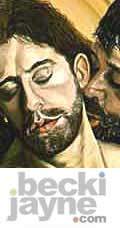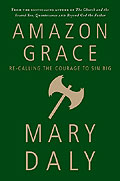I've been meaning to blog about John Dean's, Conservatives Without Conscience, and the authoritarian personality, but Sara Robinson at Orcinus already did and quite well. Dean based his book on academic studies from 50 years of research, which Sara handily summarizes. First, the basics (with emphasis added in bold):
Authoritarians come in two flavors: leaders and followers. The two tiers are driven by very different motivations; and understanding these differences is the first key to understanding how authoritarian social structures work.
Leaders form just a small fraction of the group. Social scientists refer to this group as having a high "social dominance orientation (SDO)" -- a set of traits that can be readily identified with psychological testing. "These are people who seize every opportunity to lead, and who enjoy having power over others," says Dean -- and they have absolutely no qualms about objectifying people and breaking rules to advance their own ambitions. High-SDO personalities tend to emerge very early in life (which suggests at least some genetic predisposition): you probably remember a few from your own sandbox days, and almost certainly have known a few who've made your adult life a living hell as well.
High-SDO people are characterized by four core traits: they are dominating, opposed to equality, committed to expanding their own personal power, and amoral. These are usually accompanied by other unsavory traits, many of which render them patently unsuitable for leadership roles in a democracy:
Typically menI suspect that SDO leaders are typically male due to the way we socialize boys differently than girls. Boys have been taught to be more achievement-oriented, to win, to beat the competition, to fight, and to lead. Girls are socialized to be more relationship-centric, caring, nurturing, deferring to authority and males, and to follow, even changing their identity at marriage in taking their husbands surnames. For a quick example, look to the outmoded patriarchal influence in some religions. By "God's authority," men can be priests and are the heads of households while women can't be priests and should submit to their husbands. The gap in "leadership" indoctrination impacts careers, self-worth, and other areas of life. I'm offering a simplistic explanation but I'll address these distinctions in the future.
Intimidating and bullying
Faintly hedonistic
Vengeful
Pitiless
Exploitative
Manipulative
Dishonest
Cheat to win
Highly prejudiced (racist, sexist, homophobic)
Mean-spirited
Militant
Nationalistic
Tells others what they want to hear
Takes advantage of "suckers"
Specializes in creating false images to sell self
May or may not be religious
Usually politically and economically conservative/Republican
Dean notes: "Although these collations of characteristics…are not attractive portraits, the are nonetheless traits that authoritarians themselves acknowledge." In other words, these guys know what they are, and are often quite unabashedly proud of it.
High-SDO people are drawn to power, and will seek it ruthlessly and relentlessly, regardless of the consequences to others. Many cultures (including ours, up until a few decades ago) have found these people so dangerous that they've evolved counterweights and backstops that conspire to either keep them away from the levers of power, or mitigate the damage they can do (and I'll discuss some of those in the last installment). However, modern America seems to have lost all vestiges of this awareness. Now, we celebrate our most powerful social dominants, pay them obscene salaries, turn them into media stars, and hand over the keys to the empire to them almost gratefully. They have free rein to pursue their ambitions unchecked, with no cultural brakes on their rapacity. They will do whatever they can get away with; and we'll not only let them, but often cheer them on.
We’re now at the point where these sleek Machivellian manipulators are recognized around the world as the face of American business and governmental authority. While the bulk of "Conservatives Without Conscience" goes on to explain the ways in which various members of the Bush administration have demonstrated classic high-SDO behavior, I'd also argue that our willingness to accept high-SDO leadership also accounts for toxic bosses, incompetent business planning, crooked accounting, political graft, and many of the other dysfunctions that afflict American corporate life as well.Let me pause for a moment and express my agreement in Sara's last statement. I've been in discussion with Genet about the destructiveness of the conservative movement over the past few decades. I certainly don't blame the "Bushies" for everything when a complicit and incurious mindset has passively allowed or actively participated in the neocon's political rise to power. And there's more to life than politics--careers, family, religion, culture, community, and self-actualization, the latter or lack thereof, being more critical to generation after generation of people who don't think.
For explanations, I turn to Alice Miller whose wealth of psychoanalytical writings and study can be summed up (although not adequately) as the legacy of our upbringing; how we discount, humiliate, and subvert the autonomy of children as individuals and beget adults seeking external power and approval outside of themselves, a constant endeavor that can never fully be satisfied. Rather than looking within for empowerment, children and later adults look for objects and others to act as "love object" substitutes to fill the void that's missing inside for a healthy, well-nurtured self-identity, a key ingredient being self-awareness. Indeed and regrettably, parenting too often demands that children "shalt not be aware." Do as I say or as they say robs the child of developing the ability to think for herself or himself. Do I blame parenting entirely? Mostly, yes, I do, but with the caveat that education, religion, and society-at-large has a major "parental" influence; also, at anytime, an adult can chose to heal and take responsibility, whereas children as dependents cannot without assistance or an "enlightened witness." That's why I advocate an entirely different approach to parenting, education, and mentoring. Liberating women from the chore of child-rearing would also be fundamental and transforming the patriarchy, which is itself by its primary definition a parental authority. But that's for another blog entry. Now, back to Sara (her emphasis in bold):
And yet, while these leaders are compelling, they will not be the main focus of my discussion of authoritarians. As I said: these personality traits emerge as early as three or four, and people who have them are almost always well beyond the reach of change. They have always been with us, and probably always will be. Since they represent a very small slice of the population, dealing with them effectively will, in practice, largely involve strategies to recognize them, isolate them, and prevent them from aggregating large hordes of followers.
It's those followers that we need to look at -- because they are sometimes capable of change, if you know where the leverage points are. The next two parts of this series will focus exclusively on them; for now, let's look at what Dean and Altemeyer have to say.
While the high-SDO leaders are defined by Dean as dominating, opposed to equality, desirous of personal power, and amoral, right-wing authoritarian followers have a different but very complementary set of motivations. The three core traits that define them are:
1. Submission to authority. "These people accept almost without question the statements and actions of established authorities, and comply with such instructions without further ado" writes Dean. "[They] are intolerant of criticism of their authorities, because they believe the authority is unassailably correct. Rather than feeling vulnerable in the presence of powerful authorities, they feel safer. For example, they are not troubled by government surveillance of citizens because they think only wrongdoers need to be concerned by such intrusions. Still, their submission to authority is not blind or automatic; [they] believe there are proper and improper authorities…and their decision to submit is shaped by whether a particular authority is compatible with their views."
2. Aggressive support of authority. Right-wing followers do not hesitate to inflict physical, psychological, financial, social, or other forms of harm on those they see as threatening the legitimacy of their belief system and their chosen authority figure. This includes anyone they see as being too different from their norm (like gays or racial minorities). It's also what drives their extremely punitive attitude toward discipline and justice. Notes Dean: "Authoritarian aggression is fueled by fear and encouraged by a remarkable self-righteousness, which frees aggressive impulses."
3. Conventionality. Right-wing authoritarian followers prefer to see the world in stark black-and-white. They conform closely with the rules defined for them by their authorities, and do not stray far from their own communities. This extreme, unquestioning conformity makes them insular, fearful, hostile to new information, uncritical of received wisdom, and able to accept vast contradictions without perceiving the inherent hypocrisy.
Conformity also feeds their sense of themselves as more moral and righteous than others -- a perception that's usually buttressed by the use of magical absolution techniques that they use to "evaporate guilt," in Dean's words. Because they confessed, or are saved, or were just following orders, they can commit heinous crimes and still retain a serene conscience and sense that they are "righteous people." On the other hand, when it comes to outsiders, there is no absolution. Their memory for even minor transgressions is nothing short of elephantine (as Bill Clinton knows all too well).
Dean lists other traits of right-wing authoritarian followers, most of which flow directly from the three core traits above:
Both men and women
Highly religious
Moderate to little education
Trust untrustworthy authorities
Prejudiced (particularly against homosexuals, women, and followers of religions other than their own)
Mean-spirited
Narrow-minded
Intolerant
Bullying
Zealous
Dogmatic
Uncritical toward chosen authority
Hypocritical
Inconsistent and contradictory
Prone to panic easily
Highly self-righteous
Moralistic
Strict disciplinarian
Severely punitive
Demands loyalty and returns it
Little self-awareness
Usually politically conservative/Republican
Remember this list, because these specific characteristics form the foundation of the discussion that will unfold in the next two posts. It is these traits that we will find the cracks in the wall.Yes, I will remember. Again, I am stricken with how the list encompasses so much of what Alice Miller has written from Drama Of The Gifted Child, to Banished Knowledge to Thou Shalt Not Be Aware to her more current book releases, The Truth Will Set You Free and The Body Never Lies. Sara concludes her terrific post:
As a final point: Dean's book puts to rest once and for all the right-wing shibboleth of "liberal fundamentalists" and "liberal authoritarians." Altemeyer and his colleagues have found, through decades of research, that authoritarians almost universally skew toward the far reactionary right on the political scale. This very much includes Stalinists and other "left-wing" totalitarians: though these men used socialist rhetoric to create "Communist" political orders, they're classic examples of high-SDO leaders taking control by whatever means they had at hand, and using them to create archetypal far-right authoritarian states. Dean and Altemeyer make it clear that authoritarianism is, by long-accepted definition, overwhelmingly a right-wing personality trait.
Dean is also emphatic that authoritarianism, in all its forms, is completely antithetical to both classical conservatism (he still considers himself a Goldwater conservative), and to the founding ideals of America. We must be clear: when right-wingers threaten liberals, they are directly threatening the seminal political impulse that created our nation. An operative democracy depends on having a populace that is open to new ideas, able to think for itself, confident in its abilities, willing to take risks, and capable of mutual trust. America was founded as the world's first radically liberal state. History has shown us that the nation's best moments, past and future, are created by people with a strong liberal orientation.
Authoritarians aren't merely constitutionally incapable of this kind of cultural and political openness; they are actively hostile to it, and seek to stamp it out wherever they find it. Everything in their souls drives them to dismantle the democratic impulse, and bring people under the heel of hierarchical authority -- which is why history has also shown us that the nation's worst moments, past and future, are created by people with a strong right-wing authoritarian orientation.So true. And I'm looking forward to to Sara's next two parts in the series and her ideas about how to "[map] the cracks in the wall, find effective ways to widen them, and eventually exploit them to help both afflicted individuals and our larger culture break through the insanity." Hopefully, I contribute to the discussion having been a person who "[survived] to tell the tale." For now, I hold two thumbs up to Sara. Let us spread the word.























|